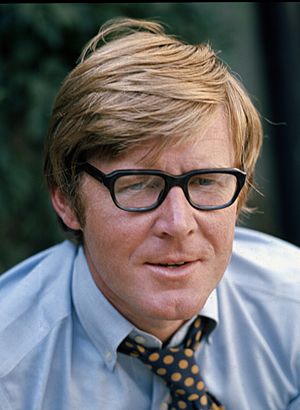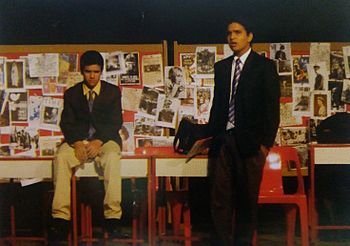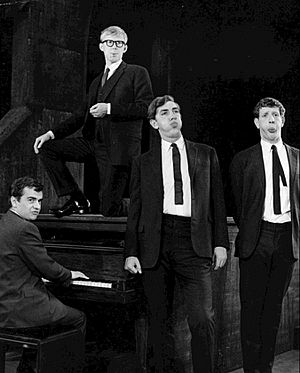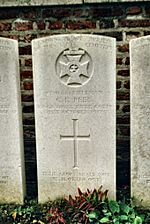Alan Bennett facts for kids
Quick facts for kids
Alan Bennett
|
|
|---|---|

Bennett in 1973; photographed by Allan Warren
|
|
| Born | 9 May 1934 Armley, Leeds, Yorkshire, England
|
| Alma mater | Exeter College, Oxford |
| Occupation |
|
| Years active | 1960–present |
| Partner(s) | Rupert Thomas |
Alan Bennett (born 9 May 1934) is a famous English actor, author, and writer for plays and films. He has won many important awards, including four BAFTA Awards for film and TV, four Laurence Olivier Awards for theatre, and two Tony Awards for Broadway shows. In 2005, he received a special award from the Society of London Theatre.
Bennett was born in Leeds, England, and later studied at Oxford University. He even taught history there for several years. He became well-known in 1960 for his part in a funny show called Beyond the Fringe. This show brought him quick fame and a special Tony Award. After that, he focused on writing full-time. His plays at the Royal National Theatre became very popular. Some of his plays were also made into successful movies, like The Madness of King George (1994), The History Boys (2006), and The Lady in the Van (2015).
Contents
Early Life and Education
Alan Bennett was born on May 9, 1934, in Armley, a part of Leeds, England. His father, Walter, was a butcher, and his mother was Lilian Mary. Alan went to Christ Church School and then Leeds Modern School. He has an older brother.
Learning Languages and History
During his national service, Bennett learned Russian at a special school for linguists. After that, he earned a scholarship to Exeter College, Oxford. He studied history and graduated with top honors. While at Oxford, he performed in comedy shows with other students who later became famous actors.
Bennett stayed at Oxford for a few years, working as a junior teacher of Medieval History. However, by 1960, he decided that teaching was not what he wanted to do long-term. He chose to focus on his creative work instead.
Alan Bennett's Career
Alan Bennett's career began in the early 1960s and has continued for many decades. He is known for his unique style of writing, which often combines humor with thoughtful observations about life.
Starting in Comedy and Theatre
In August 1960, Bennett became famous after performing in a funny show called Beyond the Fringe at the Edinburgh Festival. He performed with Dudley Moore, Jonathan Miller, and Peter Cook. The show was so popular that it moved to London and then to New York.
Bennett also appeared in a TV show called My Father Knew Lloyd George. His own TV comedy series, On the Margin (1966), was unfortunately erased by the BBC to save money on videotapes. However, in 2014, audio recordings of the whole series were found, which was great news for fans.
Writing for Stage and Screen
Bennett's first play for the stage was Forty Years On, which opened in 1968. It starred the famous actor John Gielgud. His second play, Getting On, followed in 1971.
Over the years, Bennett wrote many plays for television, stage, and radio. He also wrote screenplays for movies, short stories, and non-fiction books. He often appeared as an actor in his own works. Even though he has worked a lot with the Royal National Theatre and the BBC, Bennett prefers to write his stories first and then offer them to producers. He doesn't like to write on demand.
Some of his well-known TV plays include A Day Out (1972), A Little Outing (1977), Intensive Care (1982), An Englishman Abroad (1983), and A Question of Attribution (1991). His most famous TV work is probably the Talking Heads series from 1988. These were monologues, which are plays where one person speaks directly to the audience. They were so popular that a second series was made ten years later.
Popular Plays in the 1980s and 1990s
In 1980, Bennett wrote the play Enjoy. It had a short run at first, even with famous actors like Joan Plowright. However, a new production of Enjoy in 2008 and 2009 became very successful. It sold many tickets and had to extend its run because of high demand.
Bennett wrote The Lady in the Van based on a real experience. An unusual woman named Miss Shepherd lived in a van on his driveway for over fifteen years. He first wrote about her in an essay in 1989, then as a book in 1990. In 1999, he turned it into a stage play starring Maggie Smith. The play even had two characters named Alan Bennett. It was later made into a radio play and a successful film in 2015, with Maggie Smith playing the main role again.
Bennett also adapted his 1991 play The Madness of George III into a film called The Madness of King George (1994). The film was nominated for four Academy Awards and won one for its art direction. In 1995, Bennett hosted a three-part BBC documentary series called The Abbey, which explored Westminster Abbey.
Works in the 21st Century

One of Bennett's most praised plays, The History Boys, won many awards in 2005. These included three Laurence Olivier Awards for Best New Play, Best Actor, and Best Direction. It also won six Tony Awards on Broadway, including Best Play. A film version of The History Boys was released in 2006.
In his 2005 book Untold Stories, Bennett wrote about personal challenges his family faced. He started writing the book during a difficult time with his health, but he recovered.
In 2009, his play The Habit of Art opened at the National Theatre. It was about the friendship between the poet W. H. Auden and the composer Benjamin Britten. His play People opened in 2012, and Cocktail Sticks, an autobiographical play, also premiered that year. Both were well-received and later adapted for radio.
In 2018, Bennett's play Allelujah!, a funny drama about a hospital, opened to great reviews at London's Bridge Theatre.
Personal Life
Alan Bennett lived in Camden Town, London, for 40 years. In 2006, he moved to Primrose Hill with his partner, Rupert Thomas. Bennett also had a long friendship with his former housekeeper, Anne Davies, until her death in 2009.
Bennett was raised in the Church of England but gradually moved away from it. He considers himself an agnostic, meaning he is unsure about the existence of God.
He has turned down several honors from the British government. In 1988, he declined the award of Commander of the Order of the British Empire (CBE). In 1996, he also declined a knighthood. He explained that he would never want to be knighted, saying it would be "a bit like having to wear a suit for the rest of his life."
In 2008, Bennett gave his entire collection of writings, including unpublished works, diaries, and books, to the Bodleian Library at Oxford University. He said it was his way of thanking the British welfare state, which helped him get an education that his family might not have been able to afford otherwise.
In 2015, Bennett supported Jeremy Corbyn in the Labour Party leadership election. He approved of Corbyn, saying he brought the Labour Party back to its core ideas.
After Jonathan Miller passed away in 2019, Alan Bennett became the only living member of the original Beyond the Fringe comedy group. Bennett also owns a cottage in Clapham in the Yorkshire Dales.
Selected Works
Here are some of Alan Bennett's most notable works in film and theatre:
Film
- A Private Function (screenplay), 1984
- Prick Up Your Ears (screenplay), 1987
- Little Dorrit, 1987
- The Madness of King George (screenplay), 1994
- The History Boys (screenplay), 2006
- The Lady in the Van (screenplay), 2015
- Allelujah (co-written), 2022
- The Choral (screenplay), 2025
Theatre
- The Madness of George III (writer), 1991
- The Wind in the Willows (writer), 1991
- Talking Heads (also writer), 1992
- The Lady in the Van (writer), 1999
- The History Boys (writer), 2004
- The Habit of Art (writer), 2009
- People (writer), 2012
- Cocktail Sticks (writer), 2012
- Allelujah! (writer), 2018
Awards and Special Recognitions
Alan Bennett has received many awards and honors throughout his career.
University Honors
In 1987, he was made an Honorary Fellow of Exeter College, Oxford, where he had studied. He also received honorary doctorates from the University of Leeds in 1990 and Kingston University in 1996. However, in 1998, he refused an honorary doctorate from Oxford University. He did this to protest the university accepting money from a newspaper owner named Rupert Murdoch.
Supporting Libraries
In December 2011, Bennett visited Lawnswood School, his old school, nearly 60 years after he left. He was there to open the newly named Alan Bennett Library. He said that his play The History Boys was loosely based on his experiences at the school and getting into Oxford. Lawnswood School named its library after him because he has been a strong supporter of public libraries. He believes that closing local libraries is "wrong and very short-sighted" and that it makes "young people poorer."
See also
 In Spanish: Alan Bennett para niños
In Spanish: Alan Bennett para niños
- List of British actors
- List of Academy Award winners and nominees from Great Britain
 | Roy Wilkins |
 | John Lewis |
 | Linda Carol Brown |



